Lei Feng Network: This article is translated and organized by Peng Jing and Yu Chao. Yan Chao, a former Facebook software engineer, is now a free technology partner at Capital Partners.
This article was seen by the little devil on the foreign media, PopSci, and found that it was well written and translated. Original Address: The Unbreakable Genius Of Mark Zuckerberg.
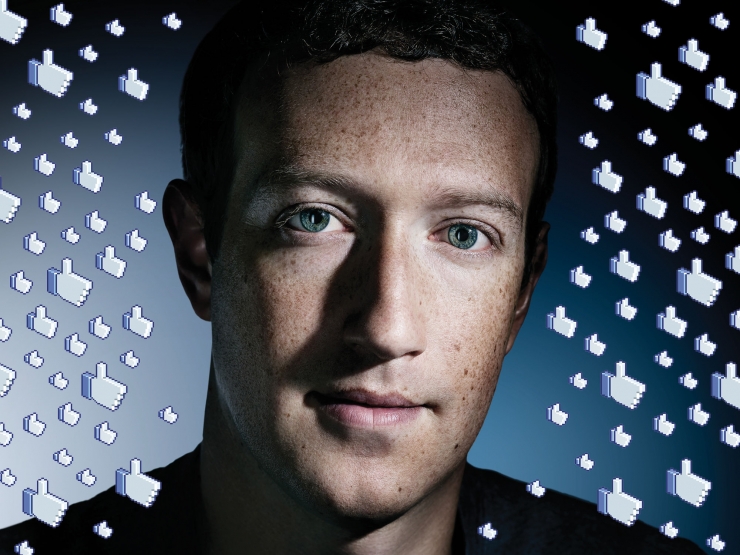
In just 12 years, the Facebook founder built an empire of 1.71 billion followers.
His next goal: to friend the rest of humanity.
Under Mark Zuckerberg's office lobby, there is a Virtual Reality studio. It is said that some national political leaders and foreign heads of state have once lost the anti-gravity table tennis or virtual shooting experience games. As for how many people have come and how many times they have come, Zuckerberg seems to be unclear, or he is inconvenient to disclose due to diplomatic etiquette. In spite of this he shared an anecdote from a certain politician: “He could not stop when he was trying out a VR device.†Zuckerberg said: “His assistant kept urging him on the side:†Mr. Prime Minister, You have to leave... we've been two hours behind the scheduled flight time.â€â€ This is Zuckerberg – the 32-year-old Facebook’s founder and CEO who’s always a pair of jeans and T-shirts - Hope that those Oculus users have the reaction.
But Oculus has far more than just anti-gravity ping pong. Zuckerberg's goal is to have it replace our laptops, smart phones, television sets, wall paintings, and even in some cases, zero-range and Friends' communication. Since then, we no longer need to carry a whole bunch of electronic products. We just need to swipe emails and select favorite programs in the virtual view to start enjoying. We will not only watch movies and games but also interact with each other in virtual reality.
In his view, as long as 10 years, "virtual reality will become a mainstream computing platform." As we now see the explosive growth of applications in smart phones, around it will also establish a complete ecosystem.
“You can go through any space by wearing it,†he said. “For instance, I want to play chess. Then we can go anywhere with a board and even go to Mars.â€
Zuckerberg's ambition is not a board, or the establishment of a virtual Mars, although this is also part of it. His ambition is to connect the entire earth . It is precisely for this reason that Facebook took over $2 billion to acquire Oculus in 2014. At the time, everyone believed that the Oculus headwear was only for games, but he saw it as a way to connect virtual societies around the world. Because of this, he is working hard to bring the Internet to drones or lasers to hundreds of millions of people in the world who have not yet reached it. In order to pursue the grand vision of connecting humans and science and technology, he even donated his entire net worth (his 99% of Facebook shares worth about 45 billion US dollars) to the "Chen Zuckerberg Fund" named after him and his wife. The goal is to "raise human potential and promote equality for all children of the next generation." Some of his plans include improving education and letting scientists and artificial intelligence engineers work together to overcome the world’s toughest cases of incurable diseases.
It can be said that in many fields, no one can do more than him in a unique perspective of connectivity. "I never underestimated him," says Ben Horowitz, Facebook's venture capitalist. He was quite determined and perseverant and tried again if he failed. He is a genius and has many resources. If he can't even lead the technological trend, no one can.
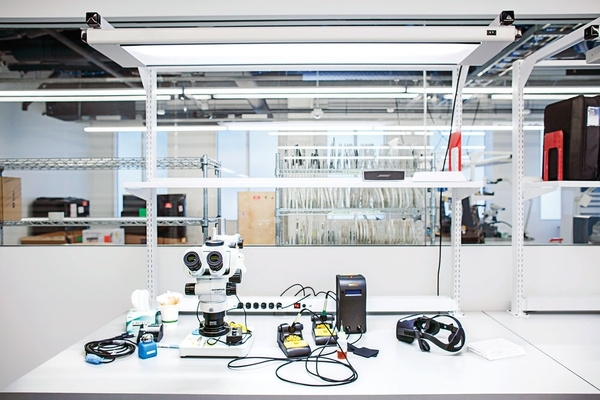
Oculus' Design Team at Facebook Headquarters Tester Hardware
Two years ago, when Zuckerberg insisted on going to Facebook to buy Oculus (3 billion US dollars), almost no one in Silicon Valley. “Everybody is scratching their heads and puzzled: 'Can VR really thrive? If so, why is Facebook doing it?'†The implication is that Facebook should focus on its own social business. Facebook CTO shrep talked about Facebook's strategy in the hardware field at the time : " Oculus didn't even have the necessary handles and immersive head trackers at the time." That's more like a demonstration of a product concept. "
However, in the past two years, there have been many significant advances in the field of science and technology: the development of higher-quality, higher-density pixel LED screens, faster processors, and better sensors. At the same time, other technology leaders followed Zuckerberg's footsteps: Google invested in Magic Leap, an augmented reality platform (it also introduced a $15 cheaper paper version that allows users to experience on smartphones. VR) Microsoft announced its HoloLens program (also augmented reality). Apple is said to be developing its own headphones.
What Zuckerberg advocates and strives to create is actually a thorough reflection on the relationship between us and the technology around us. "It makes me incredible that we are already in 2016, and it's still those programs that determine our relationship with computers and mobile phones, not the people themselves." He said: "It makes me feel abnormal and over-reliance on technology." His goal is to help the next generation build a new computing platform, where "the connection between people and people is the basic element."
His ultimate goal is to achieve a seamless link between virtual and reality: Augmented reality or mixed reality. It does not create a completely virtual community like virtual reality, but it is based on the real world. When you need someone for something, they can recruit it. "Look around you." He gestured in an empty conference room and said, "How many things are non-substantive?" There is not much. The laptop on the desk, the TV screen on the wall need not be necessary. Real existence. "It would be better to spend a dollar on the app store to buy their apps instead of spending hundreds of dollars to buy them in kind, and then you can use them everywhere," he said.
Zuckerberg thinks that social applications in the virtual world (such as going to lectures around the world, or doing 360-degree live broadcasts on the streets of foreign countries) also reduce our loneliness. Contrary to the brain's emptying over TV shows, Zuckerberg thinks that some of us are more willing to brainstorm with AR and VR. "I think a lot of people will have this question: 'Isn't it really strange that a person doesn't interact with people in real life but choose to interact with them in virtual reality?' I personally think that this view is actually not clear. The key point of virtual reality: The reality that VR replaces is that we are in a relatively passive situation in our lives, such as television. When you are making a decision, you want to have some personal experience with people. VR is this kind of The natural extension of the idea" Zuckerberg also revealed that his team is studying the impact of VR on humans. In Zuckerberg's vision of augmented reality, we will all become more social rather than more isolated.
Internet.org (Facebook's free internet service)Zuckerberg has always been committed to connecting the world. Zuckerberg believes that the Internet has the power to help people get out of poverty and improve education. This explains why he used connectivity as the cornerstone of his US$350 billion empire. As Ben Horowitz puts it, "Mark has a bigger mission than himself and he will never stop before he can achieve it." Inside Facebook, there is a large amount of resources to accomplish tasks that seem complicated, such as automatic language translation, in order that humans can ultimately communicate without any problems.
Although he suffered a setback in India, he still had full assurance that those opponents were wrong. “In India, 1 billion people have not yet used the Internet, it is a huge market,†Zuckerberg said. Today, Facebook’s free Internet service, Internet.org, has been promoted to 42 countries, allowing 2.5 million people to experience the Internet for the first time.
Zuckerberg divided the unconnected world into three categories:
One billion people cannot afford to go online;
One billion people have no Internet access on WI-FI;
Another 2 billion people do not know why they want to go online.
Little Devil Note: Although you see almost everyone has a network, and even everyone has a smart phone, but based on Internet World Stats on the global Internet user statistics show that: the world is still 50% of people have no conditions to try the Internet :
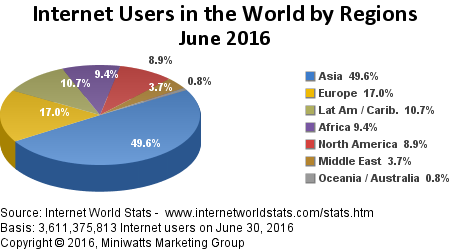
(From the figure above, as of June 30, 2016, there are 3.6 billion Internet users in the world, accounting for about 50% of the total population.)
For the one billion people who could not afford to use the Internet, Facebook is planning to launch some cheap infrastructure to reduce the cost of communications companies. In July of this year, Facebook launched a new hardware product to improve the network connectivity in rural areas: OpenCellular, a shoebox-sized transmitter that you can connect to any infrastructure to provide wireless networking for residents around you - Including the traditional 2G mobile phone network, faster LTE cellular network, and smaller Wi-Fi networks, he can also support 1500 people within 6 kilometers. Facebook plans to open-source the design of this device and let everyone share it.
For those who cannot get online in remote areas, Facebook is planning to push signals from the air through drones. The UAV, called the Aquila, is powered by a solar panel. Theoretically, it can fly for up to 3 months at a speed of 120 kilometers per hour. Although the wingspan is close to the Boeing 737, it weighs only 453 kg. In cruise mode, the power consumption is only 5,000 watts. The power consumption is only equivalent to three hair dryers or a microwave oven. According to the design plan, this drone can fly at an altitude of 18,000 meters. Through laser and millimeter wave technology, it can push the Internet to remote areas that cannot be reached by traditional network equipment. The network coverage radius is 96 kilometers.

(drone of the drone)
As for those who still don’t know what the Internet is for 2 billion people, it’s actually the hardest to connect. Zuckerberg made an analogy. "For example, you never used the internet. One day someone came to your door and asked you, 'You need to buy that kind of traffic packet'?" Your reaction is definitely "Ah? Why do I buy flow packets?" "Yes, why do you want to buy traffic if you never send emails?" The vision of connecting all human beings is ambitious. However, the process of realization is full of political participation and cultural differences, as evidenced by the reversal of India. But this goal is still at the heart of Xiaozha’s belief that the Internet is better for the world. "If we really want to connect all the people in the world and give everyone the ability to voice and share," he said, "it is not easy to realize that a world where more than half of the population is not online."
However, some people are eager to try. Elon Musk and his SpaceX company launch satellites over the Internet, and Google, as Facebook’s fiercest competitor, has also developed drones. Why Zuckerberg will succeed? "I think everyone can succeed," he said seriously. "But I think the key question is: " Who wants it to succeed? " Zach said this year that Facebook is also trying to use satellites to provide to developing countries Wireless Internet access; however, the explosion of the SpaceX rocket in recent days has led to the slow progress of this plan. (Follow-up detailed article introduction)
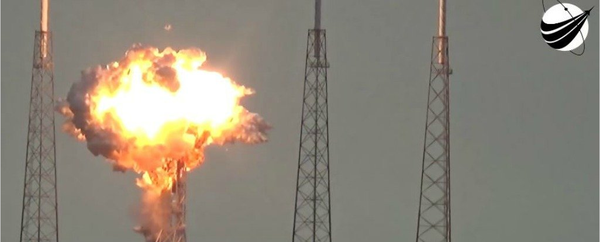
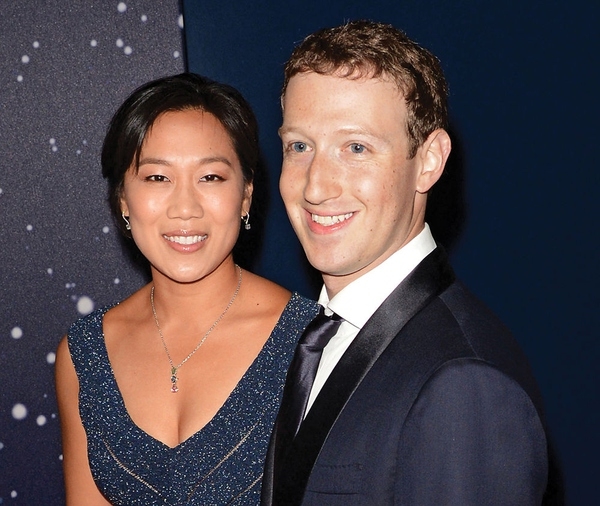
In 2015, the daughter of the Zuckerberg couple was born. Zuckerberg wrote an open letter for this, promising his daughter that he would donate 99% of his assets in support of educational reforms and tackle intractable diseases in his lifetime.
Zuckerberg has always been concerned about education . As early as 2010, he donated 100 million U.S. dollars to the education system in Newark, New Jersey. However, that donation involved too much bureaucracy and politics to disappoint him. This time, he hopes to carry out educational reforms through software. In January 2014, Zuckerberg visited a public school in Yanggu County, California. This was a special school founded by a software engineer. The classrooms are arranged like a startup company. Each desk has a computer and there is no separation between students. What attracts Zuckerberg most is that they provide personalized education. Each student learns at his or her own pace and, when faced with complex problems, forms a group to work together. Zuckerberg said with the founder that he wanted to see the engineering team that built the initial personalized education platform. The founder said "OK, I introduce you to him." What makes Zuckerberg unexpected is that this so-called “team†is actually her alone, so he made a deal with her: he would give her more engineers (as of the end of the year 30 people have been allocated from himself.) ), as long as the personalized software is free for use by other schools to connect educators and spread knowledge. About 120 schools will use this personalized educational software this school year. In the next decade, Zuckerberg hopes that half of the schools in the United States will use the software.
For Zuckerberg, education can be seen as an engineering problem, and medical research is also everything. This is the core of Chen Zuckerberg's initiative: Engineers can infiltrate into any field .
A researcher who studies the cross-section of the brain to understand neural pathways, or see the growth of cancer cells, may take several years, or even spend a lifetime of physical scanning and research. But if you apply AI (and its ability to rank information faster than humans), you can reduce this time by an order of magnitude. "If a top-notch scientist has a world-class team of engineers behind him," Zuckerberg said, "I absolutely believe we can open more doors to new worlds by building tools." In his opinion, science integrates artificial intelligence. And machine learning will someday cure diseases that kill humans such as cancer. "I really want the world to believe that by the end of this century we will be able to control and cure all diseases. I believe we can do it."
And no one has yet gone wrong betting with him.
--- END ---
With Xiaoza’s personal goal this year: to complete a virtual assistant using artificial intelligence. The prototype is as follows:
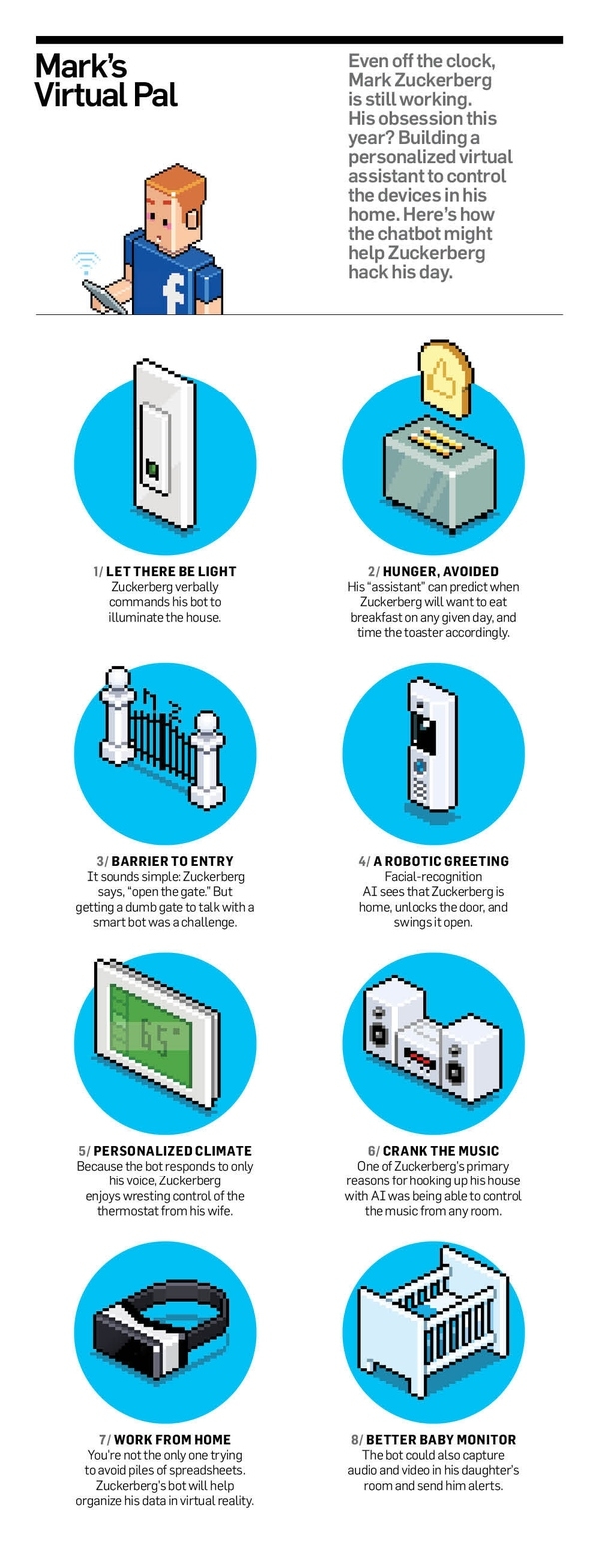
Lei Feng Network (search "Lei Feng Net" public concern) Note: Interested in attention to Chao Chao's WeChat public number: the history of the rise and fall of the Chao Chao Empire, knows about: the history of the rise and fall of the Chao Chao Empire - Across the United States & the road to technological advancement. Reproduced please contact the authorization and retain the complete information, not modify the article.